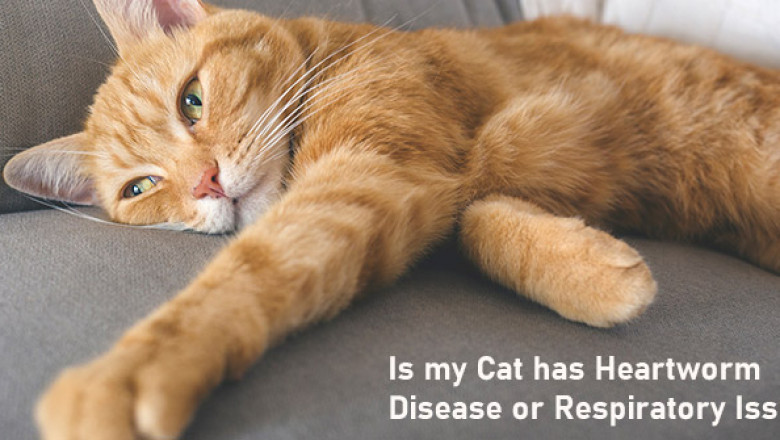views

So, how do you know if your cat has heartworm disease, and when do you know that it is a potential risk? How can you protect your cat, if it’s not Heartworm but another Respiratory issue, how can you differentiate? You might be brewing these questions, which is why we will be discussing the answers to all of these.
How can your cat get infected?
Let’s start by understanding how your feline can get Heartworms. Although this is a disease mainly prevailing in dogs, cats are not immune to it. They can get the worms through mosquito bites. When mosquitoes bite an infected animal like a wild coyote, dog, or fox, they pick up immature parasites and carry them in their bodies and when these mosquitoes bite a healthy cat they transmit the immature parasites to the feline’s body.
Here they will grow and mature over the next 6-8 months. These worms once fully grown migrate through blood vessels and travel into their heart or lungs, blocking the blood vessels after a period.
Symptoms of Heartworm
Even before these worms reach the heart or the lungs of your cat, they can cause severe damage to its body. As these parasites are large enough to block blood vessels, the immune system is awakened and this causes an inflammatory reaction. The blockage of blood vessels also makes the heart work harder to pump blood throughout the body.
When these worms reach the lungs, most common symptoms that you can see are,
- Coughing
- Difficulty in breathing
- Asthma-like breathing
- Occasional vomiting
- Poor appetite
- Weight-loss
- Difficulty in walking
- Fainting spells
- Seizures
Some of these symptoms coincide with other respiratory diseases, which is why it is difficult to distinguish between both conditions.
Why is there confusion between Respiratory problems and heartworm disease?
Immature Heartworms in the feline’s body often cause a condition called Heartworm-Associated Respiratory Disease (HARD). This damages the lungs and circulatory system and often occurs way before symptoms are evident. As we’ve seen the symptoms are more similar to other respiratory issues so it gets misinterpreted as a respiratory issue and not Heartworm. Cats have an inflammatory reaction when adult worms die; this has an allergic reaction similar to asthma.
Asthma flare-up in cats results in difficulty in breathing and coughing. The coughing often appears like vomiting hairballs, making the diagnosis more complicated. All of these similar reactions often get heartworm diseases confused with respiratory problems.
How to differentiate between heartworm disease and respiratory problems?
Cats, unlike dogs, have only 2-3 adult worms in their system and sometimes spontaneously get rid of the worms on their own. But often the damage to the heart, lungs and other organs is already done. Additionally, many cats have no adult worms; instead, they just have severe inflammation and lung damage caused by immature worms.
Now this adds to the complication as many heartworm tests are meant only for adult worms, and false-negative results are common, which leaves the cats undiagnosed. Another is antigen test, which gives results within 10 minutes but is less accurate if fewer adult worms or immature forms of worms are present.
So, to be sure that your cat has heartworm and not any other respiratory issue, you will have to combine a lot of tests like antigen and antibody tests. Along with these, you can get chest radiographs, heart ultrasounds, and Eosinophilic counts, and by combining them with the clinical signs, your veterinarian can get a near-to-accurate diagnosis.
How can you protect your feline from heartworm?
The best thing you can do for your cats is to give them regular heartworm preventive treatments. Along with these, you will have to keep your house clean and regularly groom your cats to reduce the chances of them getting a mosquito bite. Regular vet check-ups can help you keep heartworm off the table.
Prevention is always better than cure! So keep your feline healthy and safe from this dangerous disease by giving them proper care and regular treatments.












